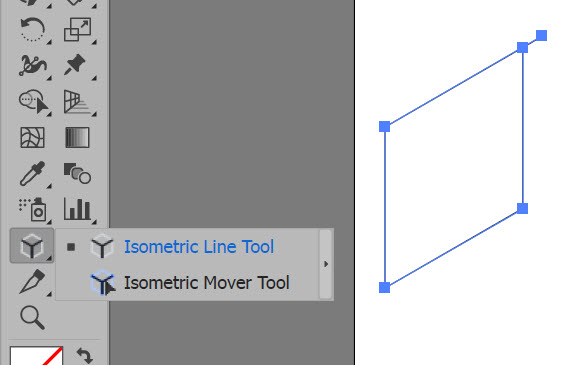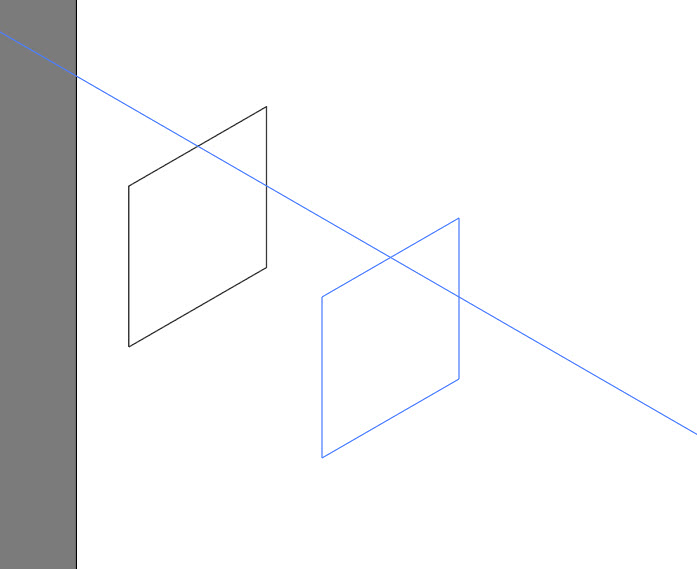Copy link to clipboard
Copied
HI there,
Recently I'm having to create isometric assets, often working over pre-existing scans or renderings. I can't find any meaningful controls for Illustrator's grid. Is it really just a simple square grid? I know I can manually set up a grid using guides, but often from image to image I need to make minor adjustment to the angles of the axes. Also, it would be really useful for me to be able to change the subdivision on the fly. Can anyone tell me if this is possible?
 1 Correct answer
1 Correct answer
There is no real provision for isometric drawing in Illustrator. Your best friends will be a grid you create yourself, and smart guides set to isometric angles.
Explore related tutorials & articles
Copy link to clipboard
Copied
There is no real provision for isometric drawing in Illustrator. Your best friends will be a grid you create yourself, and smart guides set to isometric angles.
Copy link to clipboard
Copied
Thanks for your reply, Doug.
Oh, that's a shame. I was wondering if the perspective grid could be used in this way, but I guess not.
Copy link to clipboard
Copied
That would be a really good use of the feature, I agree. There's a few uservoice topics on the subject you could vote on, but they're quite low-ranking.
Add isometric drawing tools – Adobe Illustrator Feedback
add option for an isometric grid – Adobe Illustrator Feedback
Copy link to clipboard
Copied
Illustrator has no provision for axonometric grids.
But frankly, in the 40 years or so that I've been doing isometric drawing, both "on the board" and in software, I've never been dependent upon grids, and have never known another serious axonometric illustrator who is, either.
As usually implemented, page-spanning grids are a crutch for trivial isometric drawing. Beyond the trivial, they are just cumbersome.
Functionally, they try to substitute for the freely-moveable scales affixed to "head" of the track drafter mounted on an engineering drawing table in pre-computer days. It's a poor substitute. You've already alluded to one of their problems: The increments are only useful when they correspond to measures of the subject you are drawing. Another is that in axonometric drawing, you are never concerned with measuring from the page origin; you're concerned with measuring from a pre-existing point in the drawing. So such grids should always have the ability to fluidly follow the cursor, and snap the nearest major increment to snap candidates on the page.
Instead, acquaint yourself with the Smart Guides feature, including its options, features, and keyboard modifiers. Set its Construction Guides to 30° angles.
JET
Copy link to clipboard
Copied
JETalmage wrote
Instead, acquaint yourself with the Smart Guides feature, including its options, features, and keyboard modifiers. Set its Construction Guides to 30° angles.
Kris Hunt suggests here that it would be useful if you could set constrain angles to 30° increments too, instead of shifting 45° increments round. That would probably be good enough for me.
Constrain angle setting doesn't work untuitively, and is rather useless – Adobe Illustrator Feedback
Copy link to clipboard
Copied
https://rj-graffix.com/downloads/plugins/

This free plugin helps
but the snapping system on illustrator isn't too smart
eg making a rectangle sometimes you have overshoot one of the lines and drag it back
or delete the extra with the ShapeBuilder + Alt or Option

Isometric mover tool is good too, lets you drag the whole face at correct angle
shows a nice guide line too
Though you have to Edit >Copy and Edit> Paste in front
, first if you want to move and copy, as the Alt key is for free movement

Copy link to clipboard
Copied
That's cool. I'll have a play with that.
Copy link to clipboard
Copied
That looks really cool @Ray. Thanks for posting details. I was briefly scanning the Astute plugins and I think they have something similar. However, this appears to be free (which after just emptying my bank-account, selling my first-born child into slavery and parting with my liver in exchange for a new MacBook) has recently become my favourite price.
@JETalmage I get where your coming from, but recently I've been working on interior design for large buildings. I normally take the architect's 3D model into C4D and render it out in isometric 'perspective'. I then create a custom grid which lines up with all the key features of the building. Not only does this make moving hundred of objects around a snap (pun intended), but it also seems to give me better visual cues to work with and perhaps a better understanding of the building itself. For some strange reason, individual renders often come our slightly off the 120 degrees, and it's been handy to edit each art board's grid on the fly. Having said that. most other processes are much faster in Illustrator.
Copy link to clipboard
Copied
I would have to agree that grids are not particularly helpful in doing axonometric drawing, or at least they haven't been for me. My main tool for doing technical drawings is CADtools by Hot Door (Hot Door - CADtools ). It lets you define an axonometric view and then create primitives in that space, all to scale, and much more.
I usually work from orthographic plans and then project that art to axonometric. CADtools has been an essential tool in that process. I recently used that technique to draw an axonometric cutaway of a steam locomotive, which you can read about here: How to draw a digital Big Boy locomotive. Step by Step | Trains Magazine
I'm the author of the IsoTool plugin, which I've personally been using since long before Adobe Illustrator added SmartGuides. It would be great if Adobe allowed users to save presets for SmartGuide angles, so in the meantime I decided to add custom angles to IsoTool as a workaround.
Do you remember Adobe Dimensions? When that was discontinued I wrote some Illustrator Actions to project ortho art to the off-axis view I really liked in Dimensions, which you can download here: Actions — rj-graffix
Maybe it's possible to arrive at a grid you like in Illustrator's perspective grids. I really haven't explored that much since my experience with grids hasn't been great.
But if you're drawing to scale, especially based on existing ortho art, there are several good alternatives to a grid for doing axonometric drawings.
-- Rick